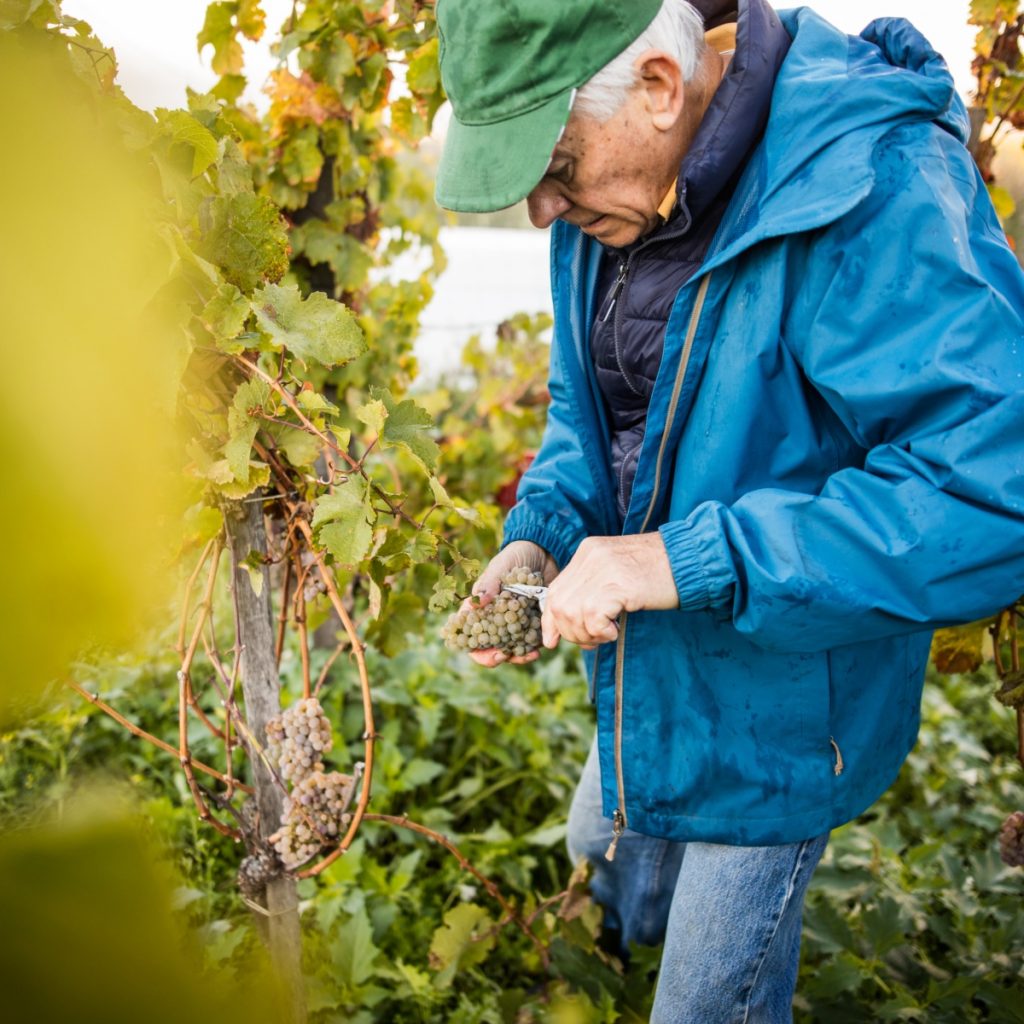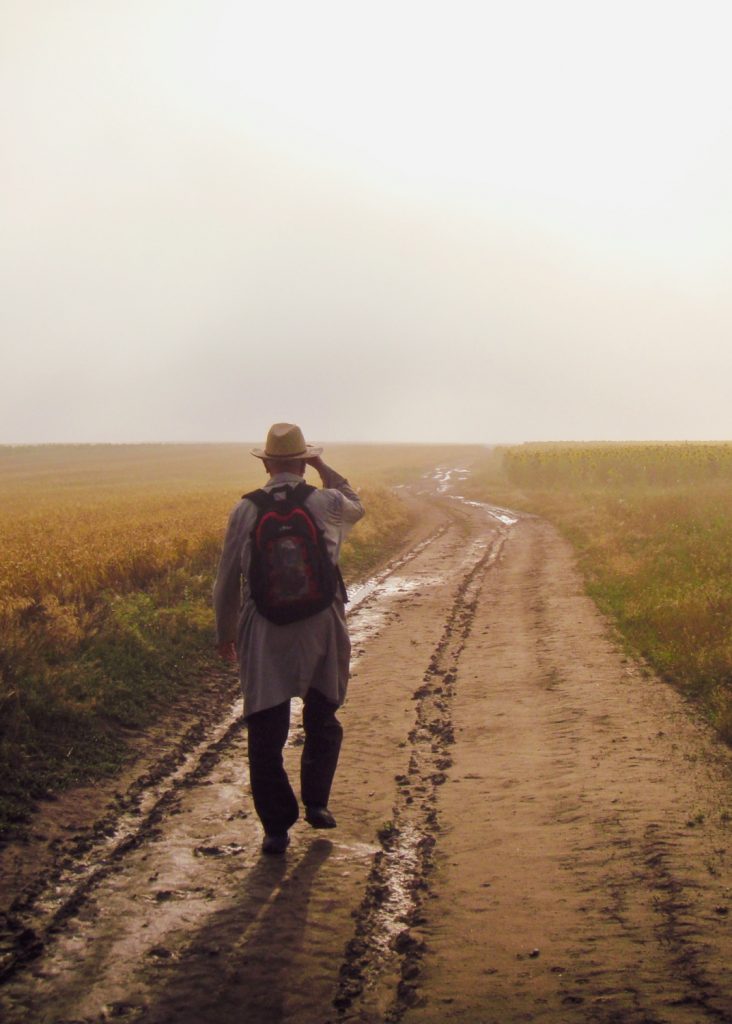As we move into the spiritual “second half of life” we may find a growing longing to slow down a bit, to be less hurried. This is not true for everyone—and our hurried world pushes against this mature desire—but slowness seems to be a quality of God’s kingdom. In my last post, I used the examples of a retreat house and a Catechesis of the Good Shepherd atrium to understand kingdom-like qualities like freedom, welcome, beauty, and silence. These spaces are also quite unhurried. The pace of things are slower. People tend to walk slower, be focused longer, and relish moments more deeply. “Haste makes waste,” as it is said.
Undue Urgency

How I imagined the evil spirit in my prayer.
As a spiritual director accompanying people who are longing to find purpose and grow into their truest selves, I’ve found that many—naturally—want to get to their imagined end quickly. Some may be less willing to allow things to unfold in due time. The evil spirit, it seems to me, works with undue urgency. God, on the other hand, works slowly. We need to find a balance between hesitation and haste. There is indeed an urgency to the work of God, but salvation history shows that this work unfolds in due time. As Paul wrote to the Galatians, God sent Jesus, “when the fullness of time had come”.
When I prayed with the Two Standards meditation from the Spiritual Exercises, I imagined the evil spirit like a fast-talking salesman peddling quick-fix solutions. And Ignatius tells us that it is an un-rushed gentleness that is characteristic of the good spirit.
As one who loves productivity tools and reads productivity blogs, I can tend to be lured by the evil spirit’s quick-fix solutions to my life’s worries. Yet I’ve found myself spending more time reading about productivity and setting up productivity systems than actually getting things done! I even feel my rest time needs to be productive! It’s hard to slow down and it can take a couple days for me to settle into multi-day a silent retreat. It’s as if my body and mind are resisting the unhurried, un-agenda’d sabbath space. On retreat or sabbath I am called to be inefficient — something completely opposed to my productivity-mindset!
 Jesus Was Inefficient
Jesus Was Inefficient
Jesus’ ministry was inefficient. It didn’t begin until 30 years after he was born. 30 years! And the average life expectancy back then was probably around age 40. He ministered for just three years and his travels were confined to the small land of Israel. It wasn’t until after his resurrection and Paul’s travels when evangelisation was more widespread. And of course when Constantine made Christianity the official religion, that changed things. Jesus obviously never set out to create a new religion but to witness to a way of life that was kingdom-focused and centred on the love of God and neighbour. He wasn’t about efficient “religious conversion”. He didn’t heal everyone. He was about real conversion of heart, which takes time and relationship-building.
As a parent, I know there is little that is efficient about raising children. I must witness to them and pray that over the slow passage of time, they absorb what it means to live well and lovingly. Just as we cannot quickly force our children into being perfect adults, faith is also something that must grow slowly over time. If we could somehow “figure out” our true selves as soon as possible then we would discover that we really hadn’t actually discovered it. That journey takes a lifetime. Are you seeing how the slow journey is really more fruitful than taking a bullet train to the destination?
Ignatius’ journey was inefficient: spending a year in a cave, nearly dying twice, being barred from entering Jerusalem, going back to school to learn basics, and then on to a theological education … But thank God for it! Growth takes time. If it were not for his slow journey, he would not have formed the relationships with the First Companions who founded the Society of Jesus. And we wouldn’t have the wisdom of the Spiritual Exercises.
So let’s start de-optimising our life a bit and embrace where we are in the journey. As Pierre Teilhard de Chardin says in his prayer “Patient Trust,”
Trust in the slow work of God.
We are quite naturally impatient in everything to reach the end without delay.
We should like to skip the intermediate stages.
We are impatient of being on the way to something unknown, something new.And yet it is the law of all progress
that it is made by passing through some stages of instability—
and that it may take a very long time.
Being Behind the Scenes
When we encounter a stage of instability or a problem in life sometimes the most efficient thing to do is to step up and just solve the problem ourselves. But sometimes keeping low and out of the spotlight is the place to be. Sometimes being slow to speak or act is wiser than reacting. I found part of this poem whose source I cannot remember:
I’ll take my place in the drama
but only read my own lines,
not those of other players,
not get into the act on stage
when my place is in the wings.

There’s a humility to this, to be behind the scenes. While canonised saints can edify us, I believe there are many more unofficial saints who will never be recognised publicly by the church because they work “in the wings” and behind the scenes doing the hidden work of God, the slow work of God. They’re not out to be a public influencer, write books, or get attention for themselves. They embrace the inefficiency of caring for the person right in front of them.
I recently came across the parable of the tourist and the fisherman where an efficient and entrepreneurial American business man meets a Mexican fisherman:
The American investment banker was at the pier of a small coastal Mexican village when a small boat with just one fisherman docked. Inside the small boat were several large fin tuna. The American complimented the Mexican on the quality of his fish and asked how long it took to catch them.
The Mexican replied, “Only a little while.”
The American then asked why he didn’t stay out longer and catch more fish.
The Mexican said he had enough to support his family’s immediate needs.
The American then asked, “But what do you do with the rest of your time?”
The Mexican fisherman said, “I sleep late, fish a little, play with my children, take siesta with my wife, Maria, stroll into the village each evening where I sip wine and play guitar with my amigos. I have a full and busy life.”
The American scoffed. “I am a Harvard MBA and could help you. You should spend more time fishing and with the proceeds, buy a bigger boat, and with the proceeds from the bigger boat, you could buy several boats. Eventually, you would have a fleet of fishing boats. Instead of selling your catch to a middleman, you would sell directly to the processor, eventually opening your own cannery. You would control the product, processing, and distribution. You would need to leave this small coastal fishing village and move to Mexico City, then LA and eventually NYC, where you will run your expanding enterprise.”
The Mexican fisherman asked, “But how long will this take?”
To which the American replied, “Fifteen to twenty years.”
“But what then?”
The American laughed and said that’s the best part. “When the time is right, you would announce an IPO and sell your company stock to the public and become very rich; you would make millions.”
“Millions?” asked the fisherman. “Then what?”
The American said, “Then you would retire. Move to a small coastal fishing village where you would sleep late, fish a little, play with your kids, take siesta with your wife, stroll to the village in the evening, sip wine, and play guitar with your amigos!”
 The American’s bold plan of entrepreneurial efficiency has the same outcome as the fisherman’s seemingly inefficient plan of living life slowly and joyfully in the here and now. And it didn’t require acquiring vast amounts of wealth. The Mexican fisherman’s wealth was already his in the little joys of his unhurried life. He didn’t need to go after something he already had.
The American’s bold plan of entrepreneurial efficiency has the same outcome as the fisherman’s seemingly inefficient plan of living life slowly and joyfully in the here and now. And it didn’t require acquiring vast amounts of wealth. The Mexican fisherman’s wealth was already his in the little joys of his unhurried life. He didn’t need to go after something he already had.
Remember, the stuff Jesus preached about the kingdom of God didn’t seem to make sense: The kingdom is like a small seed that takes time to grow. It’s like the slow process of the yeast making the dough rise. God is inefficient like a shepherd who leaves his 99 sheep in search of one or like a woman who turns her house upside down just to find a missing coin.
We’re not called to be unhurried only on retreats or on a sabbath day; we’re called to live this in all parts of our lives. God’s kingdom-like living is not just in such “thin spaces” but can be experienced at home, at work, and in our everyday lives. If we truly want it, we can make it happen. It comes through more of a spiritual mindset than making drastic external changes. Drive slower, walk slower, speak slower, look others in the eye, listen more deeply, stop multi-tasking, say no to things, create boundaries, live more simply… You can do all these things even if you work multiple jobs or have multiple kids or work in corporate finance!
How are you being invited to be a little less hurried and a little less efficient?
Related posts:
Listen to the podcast version of this post…
Salesman and fisherman pictures created using DALL·E 2, OpenAI


 Jesus Was Inefficient
Jesus Was Inefficient






Deep and wide. A lovely invitation to all that matters in the now. Thank you, Andy, for your willingness to dig deep and to share the treasures you find.